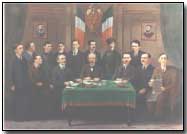Fionán Lynch (Irish: Fionán Ó Loingsigh; 17 March 1889 – 3 June 1966) was an Irish revolutionary, barrister, politician and judge.
Fionán Lynch was born in Cahersiveen, County Kerry in 1889 and educated in Rockwell College and Blackrock College. He qualified as a national school teacher in 1912 and joined the Gaelic League the same year. He produced a translation of Molière’s “Le Maladie Imaginaire” into Gaelic for the league. He was a founder member of the Irish Volunteers in 1913 and was sworn into the Irish Republican Brotherhood (IRB) that same year. He was a friend of Michael Collins. Lynch fought in the Easter Rising in Dublin in 1916 in the Four Courts garrison with Commandent Edward Daly in North King Street. Daly was executed and Captain Fionán Lynch was sentenced to death but commuted to 10 years Penal Servitude. He was imprisoned in Kilmainham Gaol and later in Mountjoy. He was one of the last Irish men to speak with Thomas Ashe before he died. He was later interned in prison in England and Wales until the general amnesty in late 1917.
Upon his release Lynch resumed his paramilitary activities and was elected as an abstentionist Sinn Féin Member of Parliament for Kerry South at the 1918 Westminster Election, becoming a Member of the 1st Dáil. At this time one of the safe houses frequently used by Lynch and Collins was at 44 Mounjoy Square, Dublin, the house of Lynch’s aunt Miss Myna McCarthy. As Teachta Dála for Kerry South he spent much time in the county on parliamentary and paramilitary activities. Many meeting were held in Tralee, in the premises of Mr.Thomas Slattery who figured prominently in the National Movement. Here he met Miss Bridget Slattery and they were married in November 1919. They lived in Dublin and awaited the sound of the army Crossley tender which brought the threat of summary arrest under the terms of the amnesty.
He was automatically elected as an abstenionist member of the House of Commons of Southern Ireland and a Member of the 2nd Dáil as a Sinn Féin Teachta Dála for Kerry–Limerick West at the 1921 elections. He supported the Anglo-Irish Treaty like almost all IRB members and during the Dáil Debates criticised some Anti-Treaty TDs. During the Civil War he fought with the Irish Free State Army and rose to the rank of Brigadier. He left the Army in 1923 to concentrate on his political career.
He was elected to the 3rd Dáil at the 1922 general election as a Pro-Treaty Sinn Féin TD and at each subsequent general election as a Cumann na nGaedhael and later Fine Gael deputy for the constituencies of Kerry from 1923 to 1937 and Kerry South from 1937 until 1944.
Lynch served as Minister for Education from April to August 1922, as Minister for Fisheries from 1922–1930, and as Minister for Lands and Fisheries from 1930–32. After the entry to power of Fianna Fáil in 1932. In 1937 he was appointed Leas Ceann Comhairle (deputy speaker) of Dail Eireann but suffered serious ill health and relinquished the post in 1938.
He qualified as a barrister after 1932 and remained a TD until his appointment as a Circuit court judge in 1944 to the Irish Speaking Sligo and Donegal Circuit.
He celebrated the Golden Jubilee of the 1916 Rising at Easter 1966, shortly before his death.

No comments:
Post a Comment